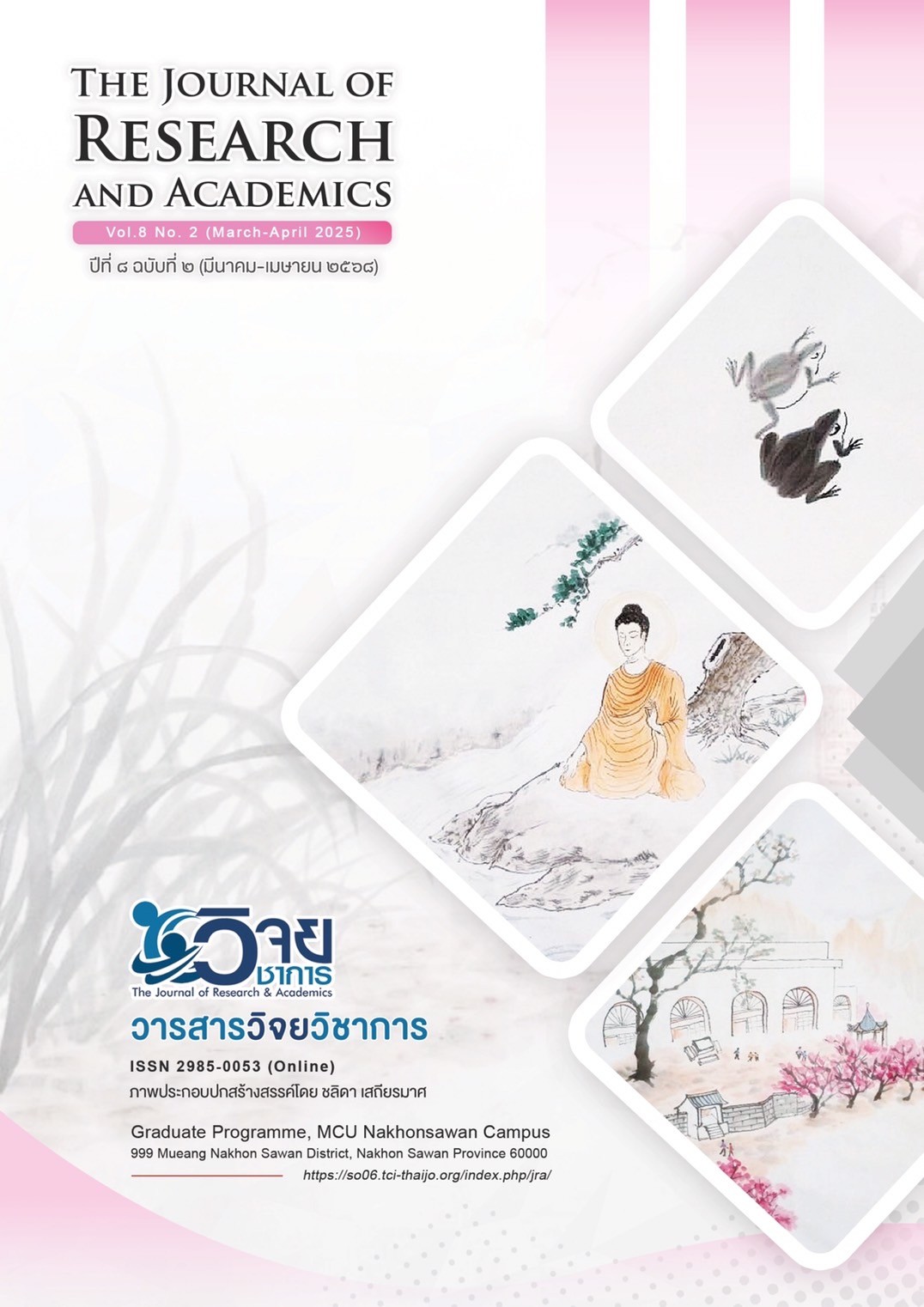Promoting Learning for the Elderly Using Board Games
Main Article Content
Abstract
This academic article aims to study the promotion of learning for the elderly using board games. It was found that learning for the elderly is a very important concept for Thai society today. Because Thailand is a super-aging society, meaning that more than 20 percent of the population is aged 60 and over. Promoting learning for the elderly using board games is a learning management that must take into account the characteristics of the elderly, the development of the elderly, the concept of learning for the elderly in both science and art in teaching adults, and Gerontology. Board games are an important learning medium for learning using games as a base because they not only focus on fun, but also provide benefits to the elderly in terms of body, mind, and society. They help slow down the degeneration of brain cells, provide fun, relieve stress, and help create society and interact with others, both people of the same age and/or children of different ages. This is considered a good way to learn together among generations.
Article Details

This work is licensed under a Creative Commons Attribution-NonCommercial-NoDerivatives 4.0 International License.
1. เนื้อหาและข้อมูลในบทความที่ลงพิมพ์กับวารสารวิจยวิชาการ ถือเป็นข้อคิดเห็น และความรับผิดชอบของผู้เขียนบทความโดยตรงซึ่งกองบรรณาธิการวารสารไม่จำเป็นต้องเห็นด้วย หรือร่วมรับผิดชอบใด ๆ
2. บทความ ข้อมูล เนื้อหา รูปภาพ ฯลฯ ที่ได้รับการตีพิมพ์ในวารสารวิจยวิชาการ ถือเป็นลิขสิทธิ์ของวารสารวิจยวิชาการ หากบุคคลหรือหน่วยงานใดต้องการนำทั้งหมดหรือส่วนหนึ่ง ส่วนใดไปเผยแพร่ต่อหรือเพื่อการกระทำการใด ๆ จะต้องได้รับอนุญาตเป็นลายลักษณ์อักษรจากวารสารวิจยวิชาการก่อนเท่านั้น
References
กรมการปกครอง. (2566). สถิติผู้สูงอายุ. เข้าถึงได้จาก https://www.dop.go.th/th/know/side/ 1/1/2449
กรมกิจการผู้สูงอายุ. (2560). ยุทธศาสตร์กรมกิจการผู้สูงอายุ 20 ปี ประจำปี พ.ศ. 2561-2580. กรุงเทพฯ : กรมกิจการผู้สูงอายุ กระทรวงการพัฒนาสังคมและความมั่นคงของมนุษย์.
กรมกิจการผู้สูงอายุ. (2564). การดูแลผู้สูงอายุ. เข้าถึงได้จาก https://www.dop.go.th/th/know /15/741
คณะพยาบาลศาสตร์ จุฬาลงกรณ์มหาวิทยาลัย และสำนักงานกองทุนสนับสนุนการสร้างเสริมสุขภาพ. (2561). เรียนรู้เข้าใจวัยสูงอายุ. กรุงเทพฯ : บริษัท ยืนยงการพิมพ์ จำกัด.
เจียรนัย ธนูธรรมาคุณ. (2564). การออกแบบเรขศิลป์เพื่อแบรนด์บอร์ดเกมที่สอดแทรกความรู้สำหรับเจเนอเรชันวาย. (สารนิพนธ์ศิลปกรรมศาสตรมหาบัณฑิต สาขาวิชานฤมิตศิลป์). คณะศิลปกรรมศาสตร์ : จุฬาลงกรณ์มหาวิทยาลัย.
ดุลยวิทย์ พงษ์เทพิน. (2565). เพิ่มประสิทธิภาพให้สมอง ประลองยุทธ์ความสนุก แบบไม่ต้องกลัวอัลไซเมอร์ ด้วยบอร์ดเกมผู้สูงวัย. เข้าถึงได้จาก https://www.allrightcorporation .com/post/manage-your-blog-from-your-live-site
ไทยรัฐออนไลน์. (2566). เกมกระดานกับผู้สูงอายุ ชะลอความเสื่อมของสมองจากโรคอัลไซเมอร์. เข้าถึงได้จาก https://www.thairath.co.th/lifestyle/lifestyle45plus/2708577
ปิยะพงษ์ ไสยโสภณ. (2564). ทฤษฎีและหลักการจัดการเรียนรู้สำหรับผู้สูงอายุ. กรุงเทพฯ : โรงพิมพ์มหาวิทยาลัยสุโขทัยธรรมาธิราช.
รัชนีวรรณ ตั้งภักดี. (2565). การพัฒนารูปแบบการสร้างบอร์ดเกมเพื่อการศึกษาในประเทศไทย. วารสารศึกษาศาสตร์ มสธ, 15(2), 117-132.
สกุล สุขศิริ. (2550). ผลสัมฤทธิ์ของสื่อการเรียนรู้แบบ Game-based Learning. (สารนิพนธ์วิทยาศาสตร์มหาบัณฑิต สาขาวิชาการพัฒนาทรัพยากรมนุษย์และองค์การ). คณะพัฒนาทรัพยากรมนุษย์ : สถาบันบัณฑิตพัฒนบริหารศาสตร์.
สฤณี อาชวานันทกุล. (2559). จักรวาลกระดานเดียว. กรุงเทพฯ : สำนักพิมพ์แซลมอน.
สำนักงานเลขาธิการสภาการศึกษา. (2561). รายงานการวิจัยเปรียบเทียบเพื่อพัฒนานโยบาย เรื่องการส่งเสริมการเรียนรู้ของผู้สูงอายุในประเทศไทย. กรุงเทพฯ : บริษัท พริกหวานกราฟฟิค จำกัด.
สำนักงานส่งเสริมการศึกษานอกระบบและการศึกษาตามอัธยาศัย. (2551). คัมภีร์ กศน. กรุงเทพฯ : ห้างหุ้นส่วนจำกัด เอ็น.เอ.รัตนะเทรดดิ้ง.
อาชัญญา รัตนอุบล. (2559). การเรียนรู้ของผู้ใหญ่และผู้สูงอายุในสังคมไทย. กรุงเทพฯ : โรงพิมพ์แห่งจุฬาลงกรณ์มหาวิทยาลัย.
Knowles, M. (1984). Andragogy in action. New Jersey : Jossey-Bass.
Olajide, O. E. & Ayantunji, M. M. (2016). Gerontology and its implications for adult education. European Scientific Journal, 12(13), 321-328.
University of Edinburgh. (2019). Playing board games may help protect thinking skills in old age. ScienceDaily. Retrieved from www.sciencedaily.com/releases/ 2019/11/191126140413.htm
Young Happy. (2556). บอร์ดเกมกับผู้สูงอายุ เล่นสนุก ผูกสัมพันธ์ ห่างไกลอัลไซเมอร์. เข้าถึงได้จาก https://younghappy.com/blog/life-style/senior-boardgame-benefit


